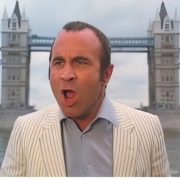The difference between an author and a scriptwriter
Writers come in many guises, though few are as talented and enigmatic as those who are generally described as screenwriters or scriptwriters. Both titles are little more than a catch-all summary for people whose world is concerned with bringing stories to life primarily for television and cinema.
Let’s take a look at this specialist subject as a homage to the men and women whose art is often overlooked when the credits roll at the end of a screened adaptation of their work.
There is no better example to explore the art of screenwriting than the 1980 film The Long Good Friday starring Bob Hoskins, Helen Mirren, and Pierce Brosnan.
The story was written by Barrie Colin Keeffe, an English dramatist and screenwriter, who originally penned the work for a TV film. The option was never taken up because of concerns over some of the plotlines. In many ways it was one of those classic pieces of rejection that must have been heart-rending at the time, but turned out to be the kind of pre-ordained fortune that leaves us scratching our what-if? heads.
If nothing else, it provided British cinema with one of its best ever gangster films. Don’t get me wrong, It’s classic noir stuff, not for the faint-hearted. Although laced with pure nuggets of humour you’d struggle to find in a dozen other films put together, this is a story of raw violence. If you haven’t seen it, take my recommendation to put it on your to-do list.
Hoskins play Harold Shand, a prosperous East End gangster who’s about to conclude a lucrative deal with some American counterparts when his cosy little world starts to explode, literally. But between the mayhem he manages to come up with some gems of dialogue.
Here’s an example:
Harold: Alan found him dying. He’d been nailed to the floor.
Jeff: When was this, then?
Harold: Well, it must’ve been just after you saw him and just before Alan saw him. Otherwise, you’d have noticed, wouldn’t you? I mean, a geezer nailed to the floor. A man of your education would definitely have spotted that, wouldn’t he?
Or what about this?
Harold: You don’t crucify people! Not on Good Friday!
My own favourite:
Pool Attendant: They kept it all incognito. They’re gonna collect the body in an ice cream van.
Harold: There’s a lot of dignity in that, isn’t there? Going out like a raspberry ripple.
Okay, enough of the excerpts, let’s look at the art of the scriptwriter. Barrie Keefe made it a career choice from an early age. Although he joined the National Youth Theatre as an actor, and actually started work as a journalist, he turned quickly to television. His first play, Substitute, was produced in 1972 and his first theatre play, Only a Game, in 1973.
He was writer-in-residence at the Shaw Theatre in 1977, resident playwright with the Royal Shakespeare Company in 1978, and associate writer with the Theatre Royal Stratford East from 1986 to 1991. He taught dramatic writing at City University, London from 2002 to 2005. In 2010 he was awarded an honorary Doctor of Letters by the University of Warwick.
I mention all this to underline the vocation and grounding Keefe had in his profession. There’s no evidence he wanted to be a novelist. His one, true calling appeared to be the use of scripts to tell a story – and in that regard he differs greatly from those of us who aspire to have their work read between the covers of a paperback (or on the screen of a Kindle!).
Can we learn anything from the Keefes of this world? You betcha!
The scriptwriter’s biggest friend is dialogue. He must devise and use it non-stop. It’s what breathes life into his characters and the story he is trying to get across. Without dialogue there would be no script (except in the case of the silent movie The Artist, which actually won an Oscar for Best Screenplay)!
Dialogue to a scriptwriter is like mortar to bricks. It’s what holds everything together. The same can’t be said for novelists.
In too many cases novelists often ignore dialogue far more than they should. As a general observation, novels are two-thirds narrative to one-third dialogue (and that’s in the better examples), while a script, by necessity, is weighted heavily the other way.
All writers should make more determined efforts to redress the balance of their dialogue by taking a leaf from the scriptwriting manual. I’ve mentioned before the need to let your characters be heard. Let them talk; let readers hear what they have to say for themselves. Give them expression to cry, shout, curse, pray, moan, groan, and all the other things normal human beings do.
There’s one other important thing we can learn from scriptwriters. Scene-setting can be as simple or as convoluted as you want it to be. Nine times out of ten go for simple!
Here’s an entirely mocked-up piece showing how an author and a scriptwriter might approach the same scene (allow for my exaggerated licence to make the point):
Scriptwriter’s version: It’s 9am on a busy London street in December. A man in a brown Fedora bends his head against heavy rain and crosses the road heading for a restaurant on the opposite side.
Author’s version: Traffic was building in the early-morning rush of one of London’s busiest streets. A man wearing a brown Fedora stepped off the rainswept pavement and prepared to navigate through the maelstrom of cars as he hurried to the small restaurant on the opposite side of the road. It was another cold, wintry day in the nation’s capital and the man was in a hurry to keep his 9am appointment.
Nothing too much wrong with either version. The point to be made is that all writers should start with the first version and add on whatever bits are necessary to tell the story the way you want to.
By fixing the scene succinctly in your head you can conjure up an immediate picture for the reader. The rest is bells and whistles – the add-ons that lend atmosphere or drama to the way you want to tell the story.
If nothing else, the scriptwriter shows us how to produce the skeleton. The rest is up to us.





Leave a Reply
Want to join the discussion?Feel free to contribute!